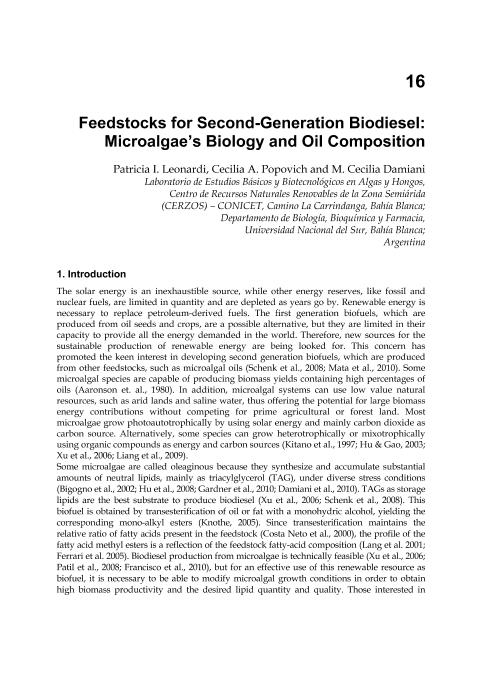Mostrar el registro sencillo del ítem
dc.contributor.author
Leonardi, Patricia Ines

dc.contributor.author
Popovich, Cecilia Angelines

dc.contributor.author
Damiani, Maria Cecilia

dc.contributor.other
Bernardes, Marco Aurelio Dos Santos
dc.date.available
2020-07-22T19:50:08Z
dc.date.issued
2011
dc.identifier.citation
Leonardi, Patricia Ines; Popovich, Cecilia Angelines; Damiani, Maria Cecilia; Feedstocks for Second-Generation Biodiesel: Microalgae’s Biology and Oil Composition; IntechOpen; 2011; 317-346
dc.identifier.isbn
978-953-307-178-7
dc.identifier.uri
http://hdl.handle.net/11336/109968
dc.description.abstract
The solar energy is an inexhaustible source, while other energy reserves, like fossil and nuclear fuels, are limited in quantity and are depleted as years go by. Renewable energy is necessary to replace petroleum-derived fuels. The first generation biofuels, which are produced from oil seeds and crops, are a possible alternative, but they are limited in their capacity to provide all the energy demanded in the world. Therefore, new sources for the sustainable production of renewable energy are being looked for. This concern has promoted the keen interest in developing second generation biofuels, which are produced from other feedstocks, such as microalgal oils (Schenk et al., 2008; Mata et al., 2010). Some microalgal species are capable of producing biomass yields containing high percentages of oils (Aaronson et. al., 1980). In addition, microalgal systems can use low value natural resources, such as arid lands and saline water, thus offering the potential for large biomass energy contributions without competing for prime agricultural or forest land. Most microalgae grow photoautotrophically by using solar energy and mainly carbon dioxide as carbon source. Alternatively, some species can grow heterotrophically or mixotrophically using organic compounds as energy and carbon sources.
dc.format
application/pdf
dc.language.iso
eng
dc.publisher
IntechOpen

dc.rights
info:eu-repo/semantics/openAccess
dc.rights.uri
https://creativecommons.org/licenses/by-nc-sa/2.5/ar/
dc.subject
BIODIESEL
dc.subject
MICROALGAE
dc.subject
LIPIDS
dc.subject
BIOENERGY
dc.subject.classification
Otros Tópicos Biológicos

dc.subject.classification
Ciencias Biológicas

dc.subject.classification
CIENCIAS NATURALES Y EXACTAS

dc.title
Feedstocks for Second-Generation Biodiesel: Microalgae’s Biology and Oil Composition
dc.type
info:eu-repo/semantics/publishedVersion
dc.type
info:eu-repo/semantics/bookPart
dc.type
info:ar-repo/semantics/parte de libro
dc.date.updated
2020-06-22T14:16:56Z
dc.journal.pagination
317-346
dc.journal.pais
Reino Unido

dc.journal.ciudad
Londres
dc.description.fil
Fil: Leonardi, Patricia Ines. Consejo Nacional de Investigaciones Científicas y Técnicas. Centro Científico Tecnológico Conicet - Bahía Blanca. Centro de Recursos Naturales Renovables de la Zona Semiárida. Universidad Nacional del Sur. Centro de Recursos Naturales Renovables de la Zona Semiárida; Argentina. Universidad Nacional del Sur. Departamento de Biología, Bioquímica y Farmacia; Argentina
dc.description.fil
Fil: Popovich, Cecilia Angelines. Consejo Nacional de Investigaciones Científicas y Técnicas. Centro Científico Tecnológico Conicet - Bahía Blanca. Centro de Recursos Naturales Renovables de la Zona Semiárida. Universidad Nacional del Sur. Centro de Recursos Naturales Renovables de la Zona Semiárida; Argentina. Universidad Nacional del Sur. Departamento de Biología, Bioquímica y Farmacia; Argentina
dc.description.fil
Fil: Damiani, Maria Cecilia. Consejo Nacional de Investigaciones Científicas y Técnicas. Centro Científico Tecnológico Conicet - Bahía Blanca. Centro de Recursos Naturales Renovables de la Zona Semiárida. Universidad Nacional del Sur. Centro de Recursos Naturales Renovables de la Zona Semiárida; Argentina. Universidad Nacional del Sur. Departamento de Biología, Bioquímica y Farmacia; Argentina
dc.relation.alternativeid
info:eu-repo/semantics/altIdentifier/url/https://www.intechopen.com/books/economic-effects-of-biofuel-production/feedstocks-for-second-generation-biodiesel-microalgae-s-biology-and-oil-composition
dc.relation.alternativeid
info:eu-repo/semantics/altIdentifier/doi/http://dx.doi.org/10.5772/23125
dc.conicet.paginas
452
dc.source.titulo
Economic Effects of Biofuel Production
Archivos asociados
